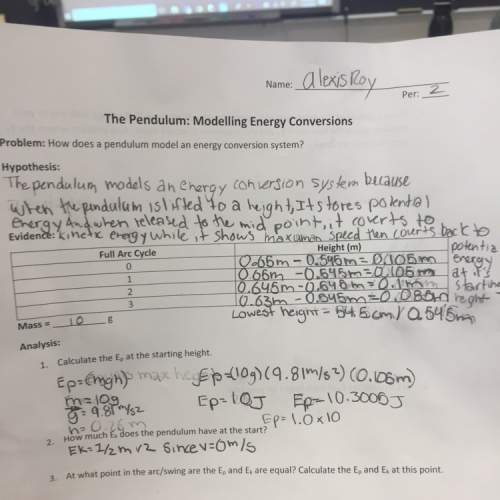
Physics, 23.08.2019 19:30 horsedoggal1234
Experiment: making observations in science success often depends on making good observations. taking note of your surroundings is part of living in the everyday world, but true scientific observation is a skill that you must develop and practice. in this project, you will test your observation skills. you will also learn how to report your findings in a scientific report. objectives recognize a valid hypothesis. make valid observations. draw conclusions concerning what constitutes "good observations." write a scientific report. in this laboratory exercise, you will choose one peanut from a bowlful and make "identifying observations" about the peanut. then you will place the peanut back in the bowl and return later to try to find it again by using your observation skills. before you begin the investigation, you should reflect on the outcome. you have already learned how to write a good hypothesis. try to identify which of the following would be a good hypothesis for this investigation. i will identify the correct peanut. if i make careful observations of a peanut, i will be able to identify the peanut at a later time. peanuts are so much alike that they cannot be separated by unique characteristics. if you chose hypothesis 2, you are correct! hypothesis 1 does not suggest any experimental design. hypothesis 3 is not falsifiable. although unlikely, it is possible that you could search through hundreds of identical peanuts and not be able to find one that is different in the sample. this doesn't mean there isn't a different one; it just means that you didn't find it. now, it's time to start the investigation! peanut mass(g) length(cm) #1 #2 #3 #4 #5 notes present your findings write a summary paragraph of 200 words discussing this experiment and the results. use the following questions and topics to guide the content of your paragraph. summarize your results. according to your data, was your hypothesis correct? (be sure to refer to your data when answering this question.) if the hypothesis was not correct, what do the results of the lab indicate the correct answer is? summarize any difficulties or problems you had in performing the experiment that might have affected the results. describe how you might change the procedure to avoid these problems. describe how the results might be applied in the real world. what would you like to do next? work on questions © 2014 glynlyon, inc. all rights reserved. terms of use

Answers: 2


Another question on Physics

Physics, 21.06.2019 17:30
What is the relationship between the wavelength of a wave and it's energy?
Answers: 1

Physics, 22.06.2019 04:00
When the force acting on an object points at least partially in the direction of the motion the work done is considered to be negative
Answers: 2

Physics, 22.06.2019 04:40
Which statement best describes copper? a. it has a low resistance and prevents charges from moving freely. b it has a high resistance and allows charges to move freely. c. it has a high resistance and prevents charges from moving freely. d. it has a low resistance and allows charges to move freely
Answers: 1

Physics, 22.06.2019 08:30
Pl asaaap ! match the term to the correct description. a type of wave that transfers energy where the particles in the medium move perpendicular to the direction in which the energy is traveling. a type of wave that transfers energy where the particles in the medium move parallel to the direction in which the energy is traveling. movement that is back and forth, like an equal sign = a type of wave that transfers energy where the particles in the medium move in a circle motion while the energy travels left or right. movement that is like a t transfers energy from one location to another 1. wave 2. parallel movement 3. perpendicular movement 4. transverse wave 5. longitudinal wave 6. surface wave
Answers: 1
You know the right answer?
Experiment: making observations in science success often depends on making good observations. takin...
Questions

Mathematics, 05.08.2019 01:00

Social Studies, 05.08.2019 01:00


Biology, 05.08.2019 01:00


Biology, 05.08.2019 01:00

Mathematics, 05.08.2019 01:00

Social Studies, 05.08.2019 01:00

Mathematics, 05.08.2019 01:00



Physics, 05.08.2019 01:00

History, 05.08.2019 01:00



Mathematics, 05.08.2019 01:00

History, 05.08.2019 01:00

Physics, 05.08.2019 01:00

Social Studies, 05.08.2019 01:00

Biology, 05.08.2019 01:00




